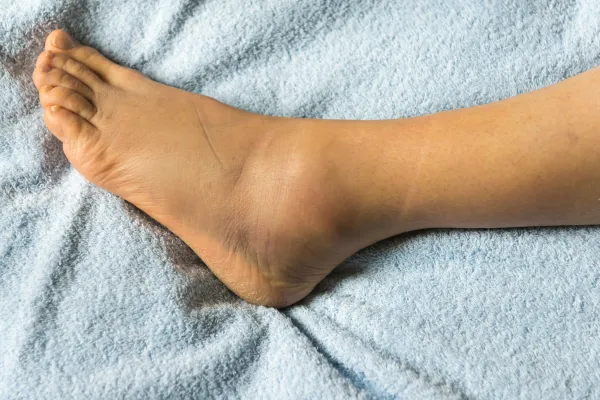Tips & Advice From West Haven Foot and Ankle Center

How Weak Ankles Can Lead to Big Problems (and What You Can Do About It)
Ever had that moment where you step off a curb or make a quick move during a game of pickleball, and suddenly your ankle feels wobbly? You’re not alone — weak ankles are a lot more common than people think. And while they might seem like a small problem at first, if left untreated, they can snowball into bigger issues that affect your everyday life.
Let’s break it down so it’s easy to understand — and even easier to fix.
What Exactly Are “Weak Ankles”?
When we talk about weak ankles, we mean that the muscles, tendons, and ligaments around your ankle joint aren’t as strong or stable as they should be. Maybe you’ve had an injury in the past (like a sprain) that didn’t heal 100% right. Or maybe your foot structure naturally makes you more prone to instability.
Whatever the cause, weak ankles can make it harder for you to balance, support your weight, or move comfortably. And if your ankles aren’t doing their job, the rest of your body — especially your knees, hips, and back — has to pick up the slack.
What Problems Can Weak Ankles Cause?
Here’s where things can get tricky:
Frequent Sprains: Weak ankles are way more likely to roll or twist. One wrong step can cause a sprain — or make an old one worse.
Chronic Pain: Ankles that don’t support you properly can create ongoing pain, not just in your feet, but throughout your legs and lower back.
Instability and Falls: Feeling wobbly increases your risk of trips, falls, and injuries. This is especially dangerous for older adults.
Joint Problems: Over time, instability can wear down your joints, leading to arthritis or tendon damage.
In short, ignoring weak ankles today can lead to bigger, more painful problems tomorrow.
How Do I Know If I Have Weak Ankles?
You might notice:
Your ankles often feel like they’re about to “give out”
It’s easy for you to roll your ankle while walking or exercising
Swelling or pain, even without a fresh injury
Trouble balancing on one foot
Feeling nervous on uneven surfaces, like trails or stairs
If any of this sounds familiar, it’s time to do something about it.
What You Can Do to Strengthen Your Ankles
The good news? Weak ankles can be strengthened! Here’s what we recommend:
1. Start Simple With Balance Exercises
Standing on one foot for 30 seconds at a time can wake up those small stabilizing muscles. Try it while brushing your teeth!
2. Add Strengthening Moves
Exercises like calf raises, toe taps, and resistance band work can really make a difference.
3. Wear the Right Shoes
Supportive footwear is key. Shoes that hug your ankles and offer good arch support can protect you from sprains and falls.
4. Use Custom Orthotics (If Needed)
If foot structure is part of the problem, custom orthotics can help correct imbalances and make your ankles more stable. (At West Haven Foot & Ankle Center, we fit orthotics that are personalized to your feet and your lifestyle.)
5. Get a Professional Evaluation
Sometimes, home exercises aren’t enough. If you’re dealing with frequent sprains, pain, or instability, seeing a foot and ankle specialist in West Haven can get you back on track faster and safer.
We offer full ankle evaluations here at West Haven Foot & Ankle Center, checking your muscles, joints, balance, and even your gait. Our goal is always to help you move confidently — without worrying about your ankles letting you down.
Final Thoughts
Weak ankles may not seem like a big deal today, but they can really limit your movement, comfort, and even independence over time. Taking steps now (literally!) can help you stay active, safe, and pain-free for years to come.
And if you ever need a little extra help, we’re here for you — just like family.
Ask West Haven Foot and Ankle Center And Their Team
Fill in the form to request a call from our team. One of our team members will call you for FREE and answer any questions or concerns you may have about your condition
Where To Find West Haven Foot and Ankle Center

If you have any questions before scheduling an appointment or for general inquiries, please use the contact us button below. Our team will promptly reach out to assist you.
Opening Hours
Monday: 8am - 5pm
Tuesday: 8am - 5pm
Wednesday: Closed
Thursday: 8am - 5pm
Friday: 8am - 5pm
Saturday: Closed
Sunday: Closed

